Jugal Hansraj: I was labeled as a jinx; when my projects were shelved, it would bring me to tears – Big Interview | Hindi Movie News – Times of India
In today’s big interview, Jugal talked about his journey in filmdom and how he fit into the ‘celebrity’ image despite his humble demeanour. He also shared some interesting anecdotes from his initial days in the industry, his personal life, and more. Read on…
As an actor, writer, National Award-winning director and now an author, is there anything else you hope to achieve or experience in your career?
Well, there are a few things I still have on my bucket list. Firstly, I aspire to achieve a major box office success, which has kind of eluded me. Apart from that, I’m currently enjoying the freedom of being a freelance actor, taking up exciting acting projects. I’m also focused on writing books, and at the moment, I’m working on book 3 of The Coward and the Sword series. Ultimately, I would love to see these books adapted into a visually captivating project, whether it’s a big-budget television series or a fantasy fiction film. Bringing these stories to life on the screen would definitely be the next big milestone I hope to accomplish.
You made your debut in films as a child actor in ‘Masoom.’ Not many child actors are successful in making a career in the industry as adults. How do you view your journey thus far?
Yes, I did make my debut many years ago as a child actor. In fact, even before that, I had acted in numerous TV commercials and press ads. So I started at a very young age, around two years old, you could say. Regarding the generalization that not many child actors find success in their careers, I believe it’s just that—a generalization. There have been plenty of child actors who have achieved great success, and others who haven’t. People tend to make assumptions and say, “Oh, you’re a child actor, you can’t make it in movies,” or “You’re a TV actor,” and so on. They have many general rules, so to speak. But if we look at examples like Hrithik Roshan, for instance, he began with a few movies as a child actor and gained immense popularity, especially through his dance sequences with Rajnikanth and Bhagwan Dada. He has now become not only a talented actor but also a huge superstar, widely adored. Sridevi ji and Neetu Singh ji were both child actors, as well. Urmila, my co-actor, also started as a child actor and went on to achieve great things. So, while people tend to generalize, it’s a mixed bag—some have succeeded, and some haven’t.
As for my own journey, I am extremely grateful to have started with such a wonderful film that still holds a special place in people’s hearts. When they think or talk about the movie, it brings a smile to their faces. I’ve had the privilege of working with some of the biggest and best directors, both as a child and as an adult. I’ve been a part of memorable films that people still cherish. So, I am grateful and have nothing to complain about. I have also directed a couple of films, won a National Award, and now I am writing books. While one could complain about movies getting shelved or other disappointments, a lot of positive things have also happened. Therefore, I choose to view my journey with gratitude.
‘Masoom’ also featured Urmila Matondkar as a child actor. Do you have any memories of shooting with her? Do you ever discuss those days when you meet? Would you like to collaborate with her again in the future?
Yes, I began my acting journey with the film ‘Masoom,’ where Urmila Matondkar played my sister. We started our careers together, and she was also part of my first film as a lead actor, ‘Aa Gale Lag Jaa’, which was released in 1994. So, we shared both of our debuts, and I have many fond memories of working with her. As a shy kid, I didn’t interact much with girls, so we didn’t have extensive conversations during ‘Masoom.’ Even when I grew up, being in my first movie made me a bit nervous. However, having Urmila by my side, someone I already knew, brought a level of comfort. Still, we didn’t have frequent interactions due to my introverted nature at that age.
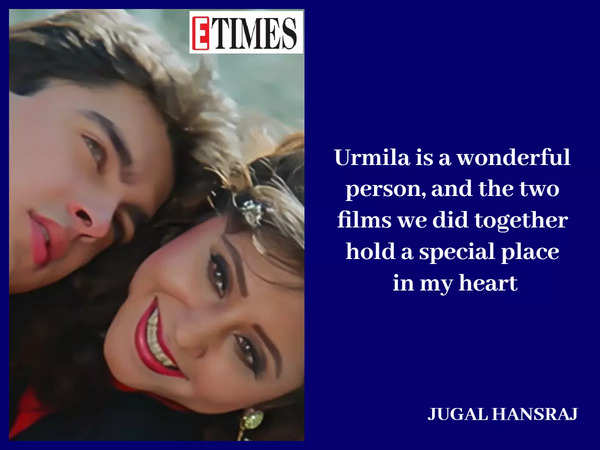
I was 21 when I did that film, my first experience singing songs and all, so it was a pleasant experience overall. Although we didn’t become best friends, I hold fond memories of working with her. Urmila is a wonderful person, and those two films we did together hold a special place in my heart. We don’t meet often or get many opportunities to do so these days, as it has been quite some time. However, whenever I do see her, it instantly brings a smile to my face, and there is a strong connection. As for collaborating with her again in the future, if the opportunity arises, I would certainly be open to it.
Satish Kaushik worked as an assistant director in ‘Masoom.’ Can you share any memories of working with him?
I believe ‘Masoom’ was his first film as an assistant director. He also had a role in the movie. In fact, I had a scene with him. He portrayed Tiwari Ji, a friend of the principal and someone who had a connection with my on-screen father, Naseeruddin Shah. He was the one who dropped me off at the station towards the end of the film. It was a wonderful experience working on that project.
Even though it was almost 40 years ago, I have vivid memories of the film. We filmed it entirely in one schedule, in Delhi and Nainital. We spent around 50 days together, living and working as a team. It was a joyous time in my life. The memories are fond, thanks to the people involved, such as Shekhar Kapur, whom I admired greatly and still stay in touch with. I hold immense respect for him and all the other talented stars in the film. And of course, Satish sir himself. He was incredibly jovial and a wonderful person. I was deeply saddened by his demise. He had a remarkable ability to bring happiness to the room. Everyone was delighted to see him. He was hardworking and proved his talent as an actor and director, both nationally and internationally. He made great films. When I used to bump into him in Mumbai, he always greeted me warmly, with kind words and a warm hug. Seeing him always brought me immense happiness.
I will forever cherish the moments I spent with Satish Ji as he was a truly wonderful person. His presence will be greatly missed.
You are doing quite well as an author (‘Cross Connection: The big circus adventure’ and The Coward and the Sword). Do you plan to write a memoir anytime soon?
Writing is a passion project for me, a labor of love. My second novel, ‘The Coward and the Sword’, published by HarperCollins, has received a great response. I have submitted the sequel to the publishers and they are pleased with it. The book is expected to be released around December, after some minor edits and illustrations. They liked it so much that they have even asked me to continue with a third book in the series.
I’m thoroughly enjoying this process, the positive and heartening feedback has been overwhelming. My ultimate goal is to see this story on screen, either as a big-budget web series or a film, with one season or one film per book. I believe it has great potential and offers a universally appealing story. The first book, ‘The Coward and the Sword’, has already achieved that to some extent.
As for writing a memoir, I don’t have plans for it in the near future. I have already shared many interesting stories and experiences in interviews over the past few years. I have worked with renowned filmmakers like Shekhar Kapur, Shyam Benegal ji, Prahlad Kakkar, Kailash Nath and had the privilege of collaborating with legendary actors like Dilip Kumar saab, Dharmendra ji, Nutan ji and others. While I have numerous anecdotes and stories, I believe memoirs are better suited for legends. I don’t think I have reached that point yet, so for now, I will focus on fiction, which is what I enjoy doing.
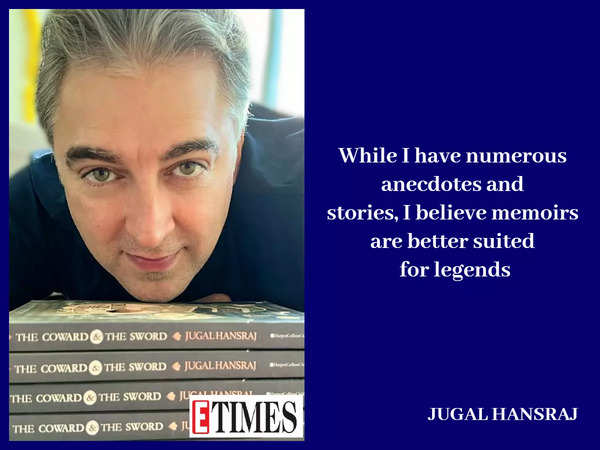
You made your debut as a lead star in ‘Aa Gale Lag Jaa’ after almost a decade. Did you have any other aspirations in that period or you knew you wanted to go back to films?
After my initial success in the movie Masoom, I found myself uncertain about my future in acting. Around the age of 13 or 14, I took a break from acting to focus on my education. I considered exploring a career in advertising or something else behind the scenes. However, at the age of 18, an irresistible offer came my way. It got an opportunity to play the lead role in a film by the renowned filmmaker Manmohan Desai, whom I greatly admired. I met him with no expectations, but to my surprise, he offered me the lead role in his upcoming teenage love story. Naturally, I was thrilled and immediately accepted the offer.
Unfortunately, that particular film, like many others that followed, didn’t materialize. It was disappointing and disheartening. Nonetheless, I have fond memories of my interactions with Manji (Manmohan Desai) and Ketan (Desai, Manmohan’s son), whom I still maintain occasional contact with. They were warm, encouraging, and wonderful individuals. Although the film didn’t happen, I will always cherish the experience.
Undeterred, I went on to sign another film by a prominent producer of that time, Balaj Nilani ji. However, that project also failed to take off. Finally, my debut film, Aa Gale Lag Jaa, became the first film I actually started working on. At that point, my main aspiration was simply to get a film started, as I had been waiting for three years without any progress. Once the film commenced, we fared well, and my aspiration evolved into wanting to continue working and taking on good roles with talented directors. I also did a film called The Dawn which had Mithun Chakraborty ji and Sonali Bendre.
After the success of Papa Kehte Hain, I signed several films that unfortunately didn’t materialize. Some people mistakenly believe that I didn’t sign any movies during that time, but the truth is that I did sign them; they just didn’t go into production. Therefore, the number of films I eventually worked on was fewer than anticipated. My approach was to go with the flow rather than follow a specific plan, focusing on collaborating with good directors and portraying interesting characters.
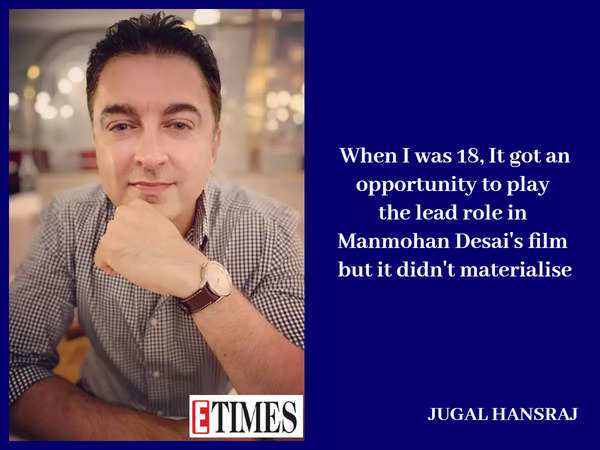
You grew up in Mumbai, but your son Sidak is growing up in New York. Are there times when you think about him missing out on things that you grew up with?
I am raising my son in New York, but I don’t believe there’s much difference from Mumbai. Both cities are vibrant and crowded, with many people and apartment buildings. He has friends from our building and in school, just like I did. In that sense, it’s quite similar. However, what matters most to me is his happiness. Whether we’re in Mumbai, New York, or anywhere else life takes us, as long as my child is content, that’s my ultimate goal as a parent. I strive to provide the best upbringing regardless of our location. Honestly, I don’t see him missing out on much beyond that.
You have revealed in past interviews about 35 to 40 projects that you signed, but they never took off. Tell us something about those films.
It is true. At one point, I sat down and attempted to count the number of acting projects I had signed. During the 90s and early 2000s, many commitments were made through handshakes rather than formal legal contracts. It was a trust-based system where both parties agreed to work together. In those days, a considerable number of films were lined up for me, some of which even went as far as costume trials and preparations for shooting. However, for various reasons, these projects simply didn’t materialize. It wasn’t due to anyone else’s fault; they just didn’t come to fruition.
As I mentioned earlier, I had signed two films with the legendary Manmohan Desai and several others following the success of Papa Kehte Hain. I had commitments with esteemed producers such as Yash Johar Ji, Raj Sippy, Roma Sippy, Mukesh Bhatt, Mahesh Bhatt, and Goel Screencraft. Unfortunately, despite these promising commitments, those films never took off. As a result, I had to turn down other movie offers because of the prior commitments I had made. It was quite challenging, and even a couple of films that I had planned to direct didn’t materialize.
For instance, there was a script I had written called Kya Pyaar Impossible. I approached Excel Entertainment, headed by Farhan and Ritesh, who were both incredibly professional and responsive. Farhan loved the script and expressed his interest in collaborating. However, we encountered rights issues as the film was a remake of an old black and white European film. Similarly, I had discussions with Ashutosh Gowariker for another project, and he was also wonderful to work with. Unfortunately, circumstances prevented these collaborations from happening.
Even during my days as a lead actor, there were a couple of film star concerts and shows that I signed up for but didn’t materialize. It was a series of missed opportunities and waiting periods. These unfinished projects cannot be released on OTT platforms since they were never completed. The waiting and idle periods were challenging, both professionally and financially. However, I choose not to dwell on regrets. Instead, I focus on the projects that did come to fruition and appreciate those experiences.
Did you also struggle to break free from the “chocolate boy” image that actors often get boxed into in our industry?
Yes, I did face that struggle, particularly during the 90s and early 2000s. If you were perceived as the good and decent boy next door, that’s how you would be typecast. It was challenging to be given opportunities to showcase versatility. I actually signed a movie in the 90s that could have allowed me to break that mould, but unfortunately, it never took off. So, I did find myself stuck in that kind of image.
The good thing is that now, with the emergence of movies and content on OTT platforms, there is a lot more opportunity for actors. I’m thoroughly enjoying this phase where I can explore different roles and work on diverse projects that deviate from what I have been accustomed to. For example, in ‘Mismatched Season 2’, I portrayed a rich, hedonistic flirt with an entitled and privileged Rajput character. On the other hand, in ‘Shiv Shastri Balboa’, I played the role of a good-hearted father to two young kids, which I immensely enjoyed.
I have recently completed shooting for a show called ‘Nanda Devi’ directed by Rohan Kambati, who was once my assistant director. I’m grateful to him for considering me for a role that I believe is the most challenging and substantial of my career. Such opportunities would not have come my way in the 90s and early 2000s. Nowadays, people are taking chances and experimenting with interesting casting choices, and it’s a positive trend for me as an actor. Currently, I don’t face the same struggles, and I relish the chance to portray diverse roles. Although some remnants of the old challenges still exist, things have significantly improved.
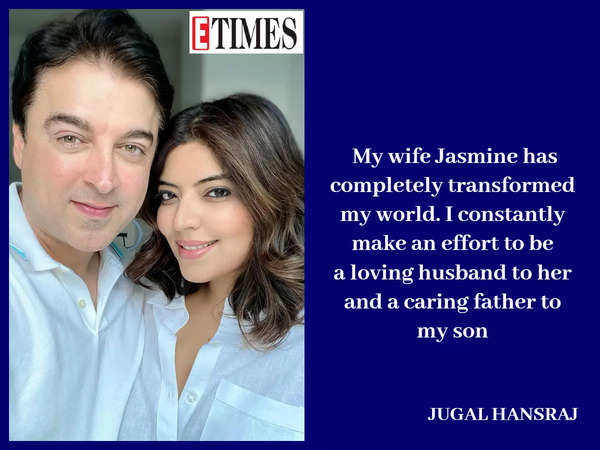
We know very little or nothing about your love story with your wife Jasmine. How and when did your love blossom?
I consider myself to be a private person, and I prefer not to divulge much about my personal life. I consciously maintain a separation between my personal life and my work as an actor, author, and director. However, I must express my immense gratitude for having Jasmine as a part of my life. I consider myself incredibly fortunate to have her as my life partner and best friend.
Our paths first crossed in 2007, thanks to a mutual friend. Jasmine is from the US, and in 2012, we reconnected and met again. Since then, these past 10-11 years have been the most remarkable and fulfilling period of my life. She has completely transformed my world. Together, we have formed a beautiful, small, and joyous family, blessed with a wonderful son.
I genuinely cannot ask for more than what I have. I am simply overwhelmed with gratitude for the life I have and the presence of Jasmine in it.
Unlike other celebs, you did not opt for a lavish wedding ceremony. Was that a conscious effort to keep your personal life private?
It wasn’t a conscious effort, but rather a reflection of who I am. I prefer to maintain a low profile when it comes to my personal life and avoid drawing excessive attention to myself. While I enjoy promoting my work and discussing my projects, I feel uneasy being in the spotlight for matters unrelated to the film industry. However, I understand that being in movies sparks curiosity among people. That’s why I joined Instagram in recent years to share aspects of my life and work, although I primarily focus on myself and my projects, rather than sharing much about my family. The same approach applied to my wedding ceremony—I chose not to share wedding pictures with the media when they requested them.
We all know about Jugal Hansraj the actor. How will you define yourself as a husband and a father?
It would be best to ask Jasmine that question, as her perspective matters the most. I must admit, the thought of her response makes me nervous. However, I strive to do my best. I am aware of my imperfections, but I can confidently say that my heart is in the right place, and my intentions are genuine. I constantly make an effort to be a loving husband and a caring father. Whether or not I am succeeding, only they can truly say. Nevertheless, I sincerely try my best, and I cherish my wife and son dearly. I am immensely grateful to have them in my life, and I will continue to do everything I can to be there for them.

You share a close bond with Karan Johar in the industry. Tell us little about your friendship. Is it true that you suggested the Kuch Kuch Hota Hai title for his debut film?
In the late 80s and 90s, Karan and I were good friends. We attended the same college and remained close even afterward. Although we don’t keep in touch much now, I have a few friends in the film industry. One is a low-profile producer who creates web series content, and I maintain a connection with Anupam Kher, with whom I recently worked on my sixth film, Shiv Shastri Balboa. Apart from them, my relationships with others in the industry are cordial but not necessarily close friendships.
Regarding the movie Kuch Kuch Hota Hai, Karan approached me to seek feedback on the script since we were friends and I was already an actor. I was pleasantly surprised by the script’s emotional depth and thought it was excellent. That night, I couldn’t sleep and ended up composing a tune in my head with the words “Kuch Kuch Hota Hai” for a Hindi film song. I recorded it on my dictaphone and shared it with our group of friends the next day during a lunch gathering. They loved the song and insisted that I sing it multiple times. Little did I know that Karan would later inform me that the tune had stayed in his mind and he wanted to use it as the movie’s title song.
Initially, I hesitated since I didn’t consider myself a professional musician and had composed the tune just for fun. However, Karan was persistent and convinced everyone that it should be the title track. Eventually, I agreed to let him use the song, though I didn’t anticipate its enormous success. The first eight lines, known as the mukhda of the song, were my composition and have remained popular to this day.
A similar situation occurred in the film Mohabbatein, where I also had a significant role. There was a famous song called “Chalte Chalte Yuhi Rukh Jata Ho Main,” and the verse or antara of that song was also my melody. Again, it was a friendly gesture as the director of the film was part of our friend circle. He liked the tune and incorporated it as the antara of “Chalte Chalte.” I’m glad both these songs have resonated with audiences, but it’s important to note that they were not professional assignments. Jatin-Lalit, the composers of the songs, elevated them with their exceptional arrangements and took them to another level.
These experiences were unplanned and stemmed from helping out friends in their respective films. I feel grateful for the popularity of these songs, but their success was unexpected.
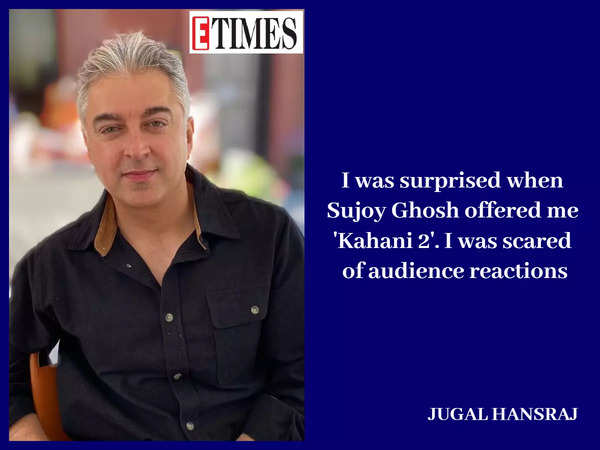
Your father was a cricketer. Did you have aspirations to be a cricketer during your growing up years?
My father, Praveen Hansraj, was a respected cricketer who played for Saurashtra in the 60s and 70s. He even participated in the Ranji Trophy and played in England with Vinoo Mankad. However, despite growing up in a cricket-centric household and having a brother who was an enthusiastic player, I didn’t aspire to be a cricketer myself. The constant cricket conversations and overdose of the game led me to lose interest, and I eventually stopped watching the game. I never had any illusions about my cricketing abilities, unlike my brother Sunil who is a Chartered Accountant but he excelled in the sport, too.
How did you deal with failure when films didn’t work?
I won’t deny that it hasn’t been tough. Dealing with the failure of my movies was incredibly difficult. Not only did I face criticism from media reviewers, but they also attacked me personally. I’ve been called various names and labeled as a jinx. Moreover, the numerous films that never even started production led people to mock me. They would make comments like, “Oh, it’s about time Jugal attends mahurats of his own films,” when I attended events for other movies. Initially, when my projects were shelved, it would bring me to tears when I was 18 or 19. However, over time, I grew immune to such disappointments. When I received calls saying that the film I had signed and was supposed to start soon was no longer happening, I would simply say, “Thank you” and hang up. I became numb to it. Nevertheless, it remains challenging when you work hard and face unkind comments about your work. Sometimes people take it personally, which is unnecessary. It’s just a movie, and one can either like it or not without resorting to personal attacks. The industry is tough, and people can be harsh and cruel, but that’s the reality one must accept when entering this field.
It was challenging because even the people you consider friendly or nice to you can change based on the success or failure of your movies. Some individuals only come back when things are going well. That’s just how some people are, although not everyone. Growing up, I was heavily influenced by a variety of films. Like most of India, I loved watching Amitabh Bachchan’s movies and Rishi Kapoor’s films. I also had a fondness for the works of Farooq Shaikh, Amol Palekar, and Hrishikesh Mukherjee. These were my favorites, and their films shaped my preferences. However, I’m simply a lover of movies and enjoy watching films of all genres. Nowadays, I’ve expanded my interests to include web series and shows from around the world, thanks to the accessibility we have. It’s a wonderful opportunity to explore diverse content, and I thoroughly enjoy it.
Given your simple nature and humble demeanor, did you ever find it difficult to fit into the ‘celebrity’ image?
Honestly, it was somewhat challenging for me, especially when I started as a lead actor at a young age. People would advise me to dress a certain way or attend specific functions to gain attention. However, it never felt natural to me, so I returned to being my authentic self. I prefer wearing simple clothes and being comfortable, without the need to show off or seek attention. I don’t judge others who choose differently; it’s just not who I am. In front of the camera, I play a role, but off-camera, I want to be true to myself. I strive to be genuine, and if people like me for who I am, that’s great. If not, there’s nothing I can do about it. I don’t seek to be loud or draw unnecessary attention. I admire actors who lead normal lives and let their work speak for itself. In my opinion, that’s the best approach.
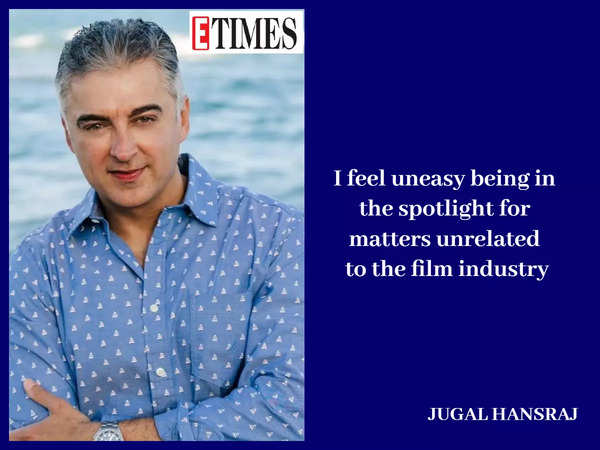
You surprised a lot of people with your character in ‘Kahaani 2’. What really prompted you to step out of the box?
I was in fact quite pleasantly surprised when I was offered the part by Sujoy Ghosh. To be honest, I was initially scared after hearing the role. I had said, ‘Why have you come to me for this part? What do you see in me that you think I can play this part well?’ I was scared of audience reactions to this kind of guy who is sexually abusing a child. The thought of that made me uncomfortable. But then I took it up as a challenge. Sujoy was convinced. I was very keen to work with him because he is a wonderful director. He’s a fun guy to work with. I wasn’t sure if I would get another opportunity to work with a director like that. I think the results turned out nice. I still get compliments for that part. Sujoy was extremely happy too and I hope to collaborate with him again.
After ‘Kahaani 2’, we saw you in Shiv Shastri Balboa recently. What attracted you to that film?
After Kahaani 2, there was a gap in my acting career as I was involved in other work, specifically content-related projects with a studio. However, I decided to take up Mismatched Season 2 and Shiv Shastri Balboa, and I owe a big thanks to Anupamji for that. He has been a wonderful presence in my life, serving as an encouraging figure and mentor. Whenever I face challenges or need advice in the film industry, I can rely on him for guidance. Anupamji motivated me to return to acting by introducing me to a director, Ajayan Venugopalan, who was working on a film being shot in the US. He believed I would be a good fit for the role and connected me with the director. Having previously collaborated on five films, including my directorial debut Pyaar Impossible, Anupamji and I share a friendly and down-to-earth relationship. The director, Ajayan, presented me with a fantastic script for a feel-good movie, and I was thrilled to be a part of it. The film featured an incredible cast, including Anupamji, Neena ji, Sharib Hashmi, Nargis, and talented child actors portraying my on-screen children. I had a wonderful experience working on the film, which received a positive response during its limited theatrical release and will soon be available on OTT platforms. I hope that audiences will appreciate and enjoy the film. I am grateful to Anupamji and Ajay for this opportunity, and I look forward to being a part of more projects like this in the future.
function loadGtagEvents(isGoogleCampaignActive) { if (!isGoogleCampaignActive) { return; } var id = document.getElementById('toi-plus-google-campaign'); if (id) { return; } (function(f, b, e, v, n, t, s) { t = b.createElement(e); t.async = !0; t.defer = !0; t.src = v; t.id = 'toi-plus-google-campaign'; s = b.getElementsByTagName(e)[0]; s.parentNode.insertBefore(t, s); })(f, b, e, 'https://www.googletagmanager.com/gtag/js?id=AW-877820074', n, t, s); };
window.TimesApps = window.TimesApps || {}; var TimesApps = window.TimesApps; TimesApps.toiPlusEvents = function(config) { var isConfigAvailable = "toiplus_site_settings" in f && "isFBCampaignActive" in f.toiplus_site_settings && "isGoogleCampaignActive" in f.toiplus_site_settings; var isPrimeUser = window.isPrime; if (isConfigAvailable && !isPrimeUser) { loadGtagEvents(f.toiplus_site_settings.isGoogleCampaignActive); loadFBEvents(f.toiplus_site_settings.isFBCampaignActive); } else { var JarvisUrl="https://jarvis.indiatimes.com/v1/feeds/toi_plus/site_settings/643526e21443833f0c454615?db_env=published"; window.getFromClient(JarvisUrl, function(config){ if (config) { loadGtagEvents(config?.isGoogleCampaignActive); loadFBEvents(config?.isFBCampaignActive); } }) } }; })( window, document, 'script', );
For all the latest entertainment News Click Here

